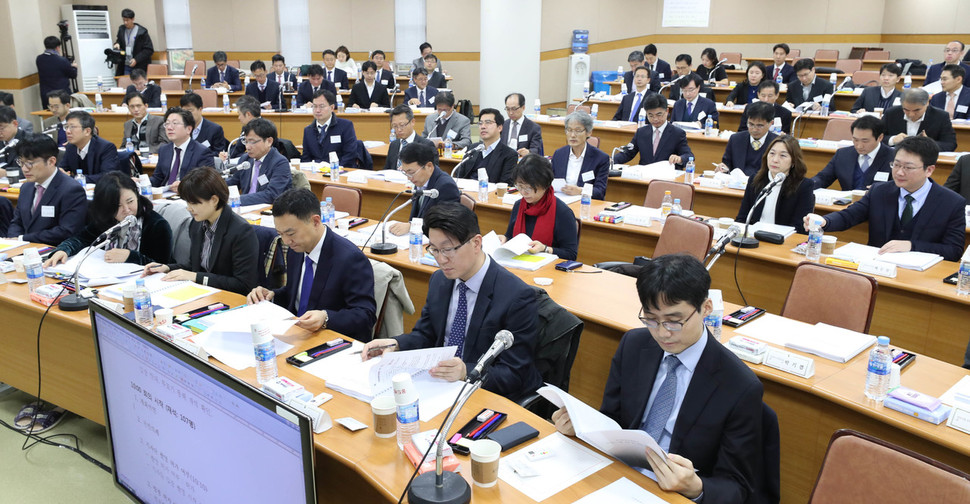 |
|
A national council of representative judges discusses the impeachment of judges implicated in the influence-peddling scandal under Yang Seung-tae, former Supreme Court chief justice, at the Judicial Research and Training Institute in Goyang, Gyeonggi Province on Nov. 19. (Baek So-ah, staff photographer)
|
Declares judicial misconduct under Yang Seung-tae unconstitutional
A national council of representative judges in South Korean courts (under Hon. Choi Gi-sang, senior judge at the Seoul Northern District Court) agreed that the judicial influence-peddling that took place during Yang Seung-tae’s term as chief justice of the Supreme Court was a grave violation of the constitution that merits impeachment proceedings. With public distrust in the judiciary growing on a daily basis, judges in the district courts, at least, appear to have shown that they’re capable of tackling corruption in their ranks. Now that the national council of judges in the district courts has agreed on the need to impeach the implicated judges, attention is turning to the National Assembly, which has the authority to pass a motion of impeachment. In its second regular meeting at the Judicial Research and Training Institute, in Goyang, Gyeonggi Province, on Nov. 19, the national council of judges adopted a resolution about actions that violate the independence of the courts. “It is our shared view that for officials with the National Court Administration to discuss the course of specific trials with government officials and advise them by drafting opinion statements and to contact district courts and make specific requests about their judgments and voice opinions about the trial proceedings is a grave violation of the constitution that demands not only disciplinary action but also impeachment proceedings,” the judges said in their opinion. After a debate that lasted for more than three hours, the national council of judges adopted this opinion, with 53 of the 105 judges in attendance in favor, 43 opposing and nine abstaining. First instance of internal call for impeachment of justices Prior to this, the argument that sitting judges implicated in the judicial scandal should be impeached had only been made outside of the courthouse. The adoption of this resolution was triggered by a statement made by six judges at the Andong branch of the Daegu District Court last week. The six judges told the judiciary that “we need to confess to the public that this clear violation of judicial independence was an unconstitutional action.” The council’s decision to advocate the presumably unpleasant idea of their fellow judges being impeached appears to have been the result of multiple factors, including the severity of this judicial scandal and the concern that the judiciary could permanently forfeit the trust of the Korean public. “A consensus formed that, if this resolution were voted down, the judiciary might completely sacrifice the ability and determination to police its own ranks,” said one judicial representative. “This was a stressful resolution, but it apparently managed to pass because of the firm resolve to take this opportunity to create a definite break with the past,” another judge said. “During the prosecutors’ investigation, we learned that [some judges] were put at a disadvantage in personnel assignments. There was a great deal of anger and a sense of betrayal against the officials who distorted the allegations about the ‘judicial blacklist,’ which is how this whole scandal began, by claiming that some judges were investigated but that they weren’t disadvantaged in personnel assignments,” this judge added. “If the national council of judges had voted down [the resolution], too, the entire judiciary would have been subject to the criticism that it’s trying to cover for its own,” said a senior judge at a district court. This debate about impeachment is also expected to be an important step in maintaining the independence of the judiciary as well as a method of monitoring that independence. Some in the judiciary and academic community assert that the fact that not one judge has been impeached since the establishment of the constitution is itself abnormal. The fact that the National Assembly has impeached two presidents, who were elected by the people, but not a single judge is itself evidence that the judiciary has been regarded as off limits, these critics say. “[Public] distrust in the judiciary remains strong, but the fact that there are decent judges in the courts gives reason to hope. The National Assembly shouldn’t wait any longer to impeach the judges who betrayed the trust in fair trials,” said Song Gi-chun, a law professor at Chonbuk National University. By Kim Min-kyoung, staff reporter Please direct comments or questions to [english@hani.co.kr]






